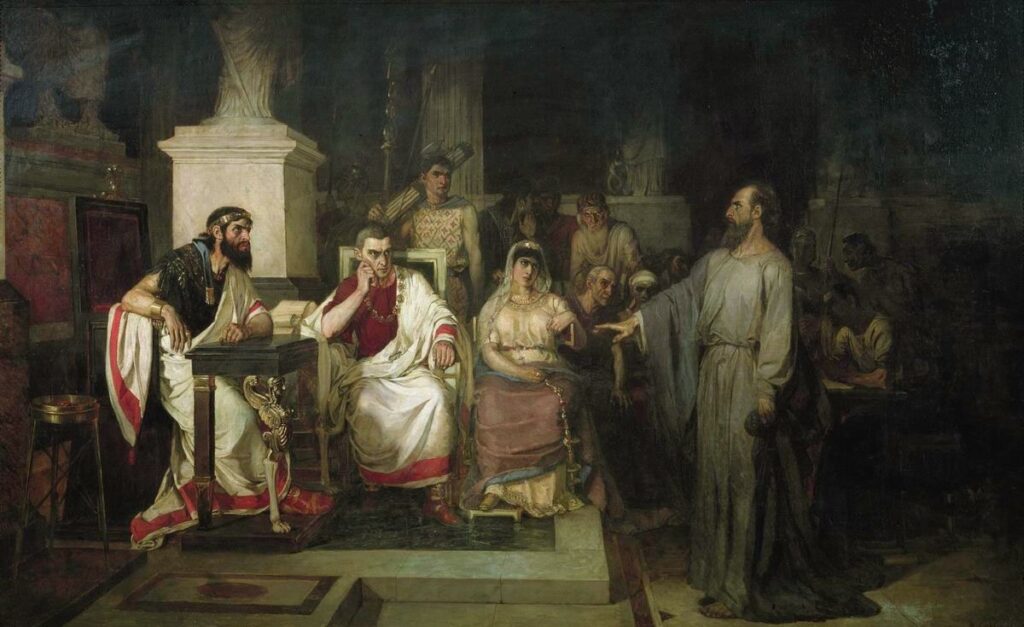
One of the most frustrating aspects of defending Christian Nationalism is dealing with those whose entire worldview hinges on modern hyper-individualism. Most people will concede (sometimes grudgingly) that you ought to love your own parents, wife, and children more than strangers. Nevertheless, when you suggest that one should therefore also love his own nation more than foreign nations, they find it beyond the pale. The 4th Commandment, they think, implies no such thing.
This disconnect is a sad testament to the 20th century’s focus on the nuclear family to the exclusion of extended family. Modern traditions sever our children from their families, communities, and congregations for the sake of education and career, obscuring the ordinary ties that bind men together. The resultant poverty of identity makes us think of ourselves as individuals first and even our most important relationships as arbitrary. And when nations are seen as arbitrary collections of random individuals, it’s difficult to see why we owe them any special love.
Sad or not, however, that is the reality our generation has been given. Mourning America’s poverty of national identity is appropriate, but those who know better should also try to help those in need–even if it usually feels like explaining why water is wet. So let’s take the opportunity to start from square one: the 4th Commandment.
Honor Thy Father and Thy Mother
When God tells us to honor our father and mother, He is commanding a kind of respect that goes beyond simply loving them. He has given them a responsibility for our well-being and an authority to go along with it. Honoring them involves respecting that authority by willing obedience while under their direct care and by reverence throughout our whole lives. Honor also includes gratitude for the many ways they’ve succeeded in carrying out that responsibility–ways which most people never understand or appreciate until they become parents themselves. Without the work of our parents–even if they were negligent in some ways–we would have literally nothing in this life, not even our bodies. Accordingly, we are to treasure and esteem them for the position and work which God Himself has assigned to them. So far so good.
Next, we need but a moment’s reflection to realize this honor does not (and logically cannot) stop with our mother and father. Our parents also have parents of their own whom God has commanded them to honor. In order to properly honor our parents, we must therefore also honor our grandparents for our parents’ sake. After all, one can hardly honor his father and mother by raising his children to despise them.
What’s more, a great deal of what our parents pass on to us is simply what they received from their own parents. We should therefore have gratitude to our grandparents as well. To be sure, our parents do come first. Grandma and grandpa don’t get to override whatever mom and dad told you. Still, God did not create a world in which true honor evaporates as soon as you’re one generation removed.
Neither does this honor stop at death. We do not simply toss our parents’ bodies into the backyard for the vultures as though our job were done, but honor them with a Christian burial and leave flowers on their graves. We tell their stories to their grandchildren, use any inheritance responsibly, and try to continue living in a way which would make them proud. As with any kind of honor, a sinful world or sinful parents may make this more or less difficult. Nevertheless, the true honor due to our parents cannot immediately transform into disregard at the moment of their death.
Taken together, these two simple and obvious truths make it quite clear that God has commanded us to honor our ancestors. To be sure, this honor becomes more abstract the further up the family tree we go. Most of us don’t even know our ancestors’ names after a few generations. Even so, honor remains possible because our ancestors have left us a heritage. At the very least, we all possess body and life simply because of choices made by a thousand generations before us. Usually, we inherit a language, a country, a government, a culture, and a way of life as well. Those who are truly fortunate will possess a heritage that includes things like property, reputation, and the Christian faith. And if you do not, you are blessed with the opportunity to be the first in your family to begin building such an inheritance for your own children.
To honor our ancestors means to treasure our heritage and receive it with gratitude. We respect the work that went into it and do our best to maintain and preserve all the good within it so that we may pass it on to our own children. We do not look a gift horse in the mouth over any imperfections or perceived deficiencies. No one’s heritage is perfect, for we and our ancestors have all been sinners. Nevertheless, it was to sinners that God gave the Fourth Commandment. Our ancestors’ failings are therefore no excuse to refuse to honor them.
To be clear, this does not mean we’re enslaved by our heritage–that we can never change a single thing while we steward it. But honor does alter how and why we change things. We can liken it to inheriting a family home. Treasuring that home will always involve maintenance–things like new shingles, carpet, and paint from time to time. Sometimes, it involves building an addition or tearing down that unsalvageable shed your parents failed to maintain. But whatever changes you need to make, you make them with both honor for your parents and love for your children. So it is with any other part of our inheritance.
Love Your Posterity
This brings us neatly to the unspoken half of the 4th Commandment. The literal sense instructs children to honor their parents. Nevertheless, a moment’s reflection will demonstrate that this obligates the parents as well. Our honor and authority is not for our own sake, but for the sake of our children. The office and authority exist to care for the offspring with which God blesses us, for God designed humanity so that our young ones cannot take care of themselves. Therefore, just as we honor our parents above strangers, we also love our own children over strangers. This priority is so clear even by natural law that the Apostle Paul goes so far as to say, “if anyone does not provide for his relatives, and especially for members of his household, he has denied the faith and is worse than an unbeliever.”
As before, this straightforward reality does not abruptly stop with a single generation. The special love we have for our children naturally extends into a love for our grandchildren. After all, how can we love our children by treating their own children as though they were nothing special to us? We gave of ourselves to our children to help them prosper, but part of that prosperity is having children of their own.
We must therefore give of ourselves to our grandchildren as well through our children. The joy with which grandparents greet their grandchildren is no mere custom or affectation. It is the normal and natural response of godly men and women seeing the fruits of their long years of service to their children. Scripture likewise affirms this extension, for Proverbs says that a righteous man leaves an inheritance to his children’s children.
For similar reasons, our love also extends laterally through our cousins, nieces, nephews, aunts, and uncles. If parents must prioritize loving their own children, then siblings likewise must prioritize loving one another for their parents’ sake. It shouldn’t take anyone much effort to remember how much of their parental instruction involves making sure siblings get along. And if we must honor our grandparents along with our parents, then we must also love our cousins, for they are all the grandchildren of those we honor. This love also extends down through the generations. Caring for our nieces and nephews more than we do for random strangers is not only normal, it’s an organic extension of the 4th Commandment.
Therefore, just as our honor extends up the family tree, so too does our love extend downwards and outwards–even to those children who are not yet conceived. Our pious hope that God will bless our children with children of their own requires this extension. And yes, as before, our love becomes more abstract the further into the future it reaches. We will not live long enough to know the names of our great great grandchildren or our 6th cousins thrice removed (in this world, at least.) Nevertheless, we act according to that hope by planting trees in whose shade we will never be able to sit. We take the heritage we’ve received and cared for and then pass it on to our entire posterity as Scripture commands.
Cherish Your Nation
We’ve now established that the 4th Commandment extends all throughout our family tree and that we obey it by means of the heritage we inherit and bequeath. From there, applying it to our nation is only a simple logical step away. The further we traverse our lineage, the more people our honor and love encompass. What’s more, they hold their heritage in common with other relatives who may not be in your direct family line. This heritage includes a common language, culture, religious sensibility, country, and history. An individual may hold any of these things, but no individual can maintain them on his own. This means that honoring our father and mother ultimately requires working collectively with our extended family: our tribes and nations.
As much as modernists try to remove any sense of blood and ancestry from the word “nation,” the etymology will always have its revenge. The “nat” in nation is, after all, the same as the “nat” in natal. That’s why the word has traditionally referred to men living amongst one-another with the recognition of sharing common ancestry, culture, language, belief, and history. Therefore just as we have a special regard for our own parents over other people, and our own children over other children, so too must we hold a special regard for our own nation over other nations.
We must also treat our national heritage as we treat our family heritage: we treasure it, maintain it, and pass it on to our posterity rather than despising it, neglecting it, and parceling it out to strangers. In other words, we must not, as Jesus said to the Canaanite woman, take the children’s bread and give it to the dogs.
That Jesus expressed this idea in such blunt terms should be a clue that the reality of national inheritance and priority is recognized throughout Scripture. The Biblical nation of Israel was, after all, named after a specific man and is comprised of his posterity. God describes the land collectively held by this nation in familial terms as their inheritance. God gave this nation laws which favored the Israelites over foreigners. God threatened this nation with the ascendance of foreigners within their land if they despised His commandments. Virtually nothing in the Old Testament makes sense without the presumption that the 4th Commandment extends to ancestors and posterity.
But if our responsibilities extend so far through our family tree, then don’t they extend to every human on Earth? Of course! Everyone is, after all a son of Adam or daughter of Eve at the end of the day. That’s why we regard even strangers more highly than whales, spotted owls, rocks, or trees. When we encounter a man beaten by the side of the road, we offer him aid regardless of how distantly he is related. We have any number of moral responsibilities to our fellow man that we don’t have to other creatures.
But as we’ve already established, the further the relation, the more abstract the responsibility, and mere humanity is the most abstract of all. Unlike a nation, humanity does not share a common language, culture, or religious belief which can be cared for together. The history and ancestry we hold in common in likewise far more limited. We must keep the moral law with respect to everyone (i.e. to love everyone) because we all share the same nature; but there is no equality to be found there. Whenever we remember our vocations, we cannot help but realize that God has given us special responsibilities to certain neighbors which are not shared among all of humanity. Shared humanity therefore cannot stop us from loving our own nation more than other nations any more than shared nationality stops us from loving our own family more than other families.
Ordo Amoris
Scripture and plain reason clearly provide a hierarchy to our loves (or ordo amoris, if you prefer). Our families come before strangers. Our tribes come before outsiders. Our nations come before foreigners. When we reject that hierarchy in favor of equality, we deny the 4th Commandment.
Postwar liberals will, of course, claim that all these obvious conclusions are being made simply to justify racism, kinism, racial partiality, or whatever label they’re using these days. The truth, however, is that they are using their own Pavlovian response to racism to justify abandoning God’s clear instructions to us. The Spirit of the Age is dead-set against the 4th Commandment in our time, and seeks to minimize its reach however possible. We have, sadly, been discipled thoroughly by the world and that training obscures God’s Word among us. Accordingly, most will contend that we have no need to honor our ancestors or care for our posterity. Just like the Pharisees, they use their traditions to make void the word of God.
But the truly wicked go even further. They do not simply neglect their obligation to ancestors and posterity, but command others to deliberately reject such honor. They put their lies in God’s mouth to say we must treat our nation and countrymen as though they were interchangeable with every other people on earth. They call it selfish to want children of their own people or to maintain an inheritance for them that isn’t open to the rest of the world. I’ve written before that Marxism is the demonic inverse of family, and their replacement of the 4th Commandment with equality continues to prove them to be Satan’s flock. Truly, they are foremost among those who call evil good and good evil in the modern age.
But it need not be so among Christians. We have heard God’s Word. He has gifted us with wisdom to understand and apply it. Doing so in defiance of the Devil, the world, and our sinful flesh is the ordinary trial for every Christian living in this vale of tears. We should be thankful that Providence has made it so easy to recognize in our own day and appeal to God for the strength to resist it.





